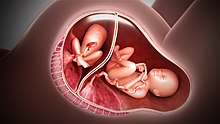
Twin reversed arterial perfusion sequence, also called TRAP sequence, TRAPS, or acardiac twinning, is a rare complication of monochorionic twin pregnancies.[1] It is a severe variant of twin-to-twin transfusion syndrome (TTTS).[2] In addition to the twins' blood systems being connected instead of independent, one twin, called the acardiac twin, TRAP fetus[3] or acardius, is severely malformed. The heart is missing or deformed, hence the name "acardiac", as are the upper structures of the body. The legs may be partially present or missing, and internal structures of the torso are often poorly formed. The other twin is usually normal in appearance. The normal twin, called the pump twin, drives blood through both fetuses. It is called "reversed arterial perfusion" because in the acardiac twin the blood flows in a reversed direction.[4][5]
TRAP sequence occurs in 1% of monochorionic twin pregnancies and 1 in 35,000 pregnancies overall.[6]
- ^ Shulman, Lee P.; van Vugt, John M. G., eds. (2006). Prenatal medicine. Washington, DC: Taylor & Francis. p. 447. ISBN 0-8247-2844-0.
- ^ Knipe, Dr. Henry and Dr. Yuranga Weerakkody; et al. "Twin reversed arterial perfusion". Radiopaedia.org. Retrieved 18 February 2016.
- ^ "Twin Reversed Arterial Perfusion Sequence". C.S. Mott Children's Hospital. University of Michigan Health System. Retrieved 18 February 2016.
- ^ "Twin Reversed Arterial Perfusion Sequence". The Fetal Center. Children's Memorial Hermann Hospital. Retrieved 18 February 2016.
- ^ "TRAP Sequence or Acardiac Twin". The Fetal Treatment Center. UCSF Benioff Children's Hospital. Archived from the original on 28 October 2014. Retrieved 18 February 2016.
- ^ Chandramouly M, Namitha (February 2009). "Case series: TRAP sequence". The Indian Journal of Radiology & Imaging. 19 (1): 81–3. doi:10.4103/0971-3026.45352. PMC 2747410. PMID 19774147.